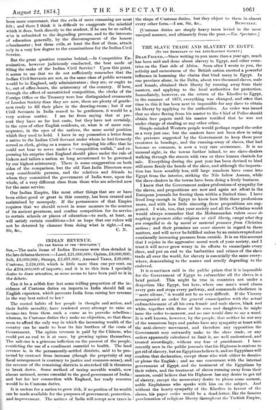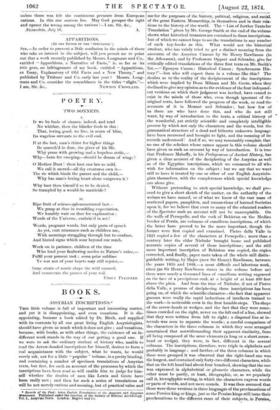THE SLAVE TRADE AND SLAVERY IN EGYPT. ere THE SECRETARY
OF THE ANTI-SLAVERY SOCIETY.] DEAR FRIEND,—Since writing to you more than a year ago, much has been said and done about slavery in Egypt, and other coun- tries on the East side of Africa. Soon after I wrote to you, the activity and earnestness of the British nation exerted a powerful influence in loosening the chains that bind many in Egypt. In one province alone, in the Delta, about two thousand slaves, male and female, obtained their liberty by running away from their masters, and applying to the local authorities for protection. Immediately, however, on the return of the Khedive to Egypt, in the summer of 1873, everything was changed, and since that time to this it has been next to impossible for any slave to obtain his liberty by applying to the authorities. An order was issued that DO slave fleeing from his master to the Chief of Police should obtain free papers until his master testified that he was not under charge of stealing or any other crime.
Simple-minded Western people would perhaps regard the order as a very just one, but the masters have not been slow in using the pretence suggested by the Government to keep these poor creatures in bondage, and the running-away of slaves, that had become so common, is now a very rare occurrence. It is no unusual sight, in the towns further inland, to see slave-dealers walking through the streets with two or three human chattels for sale. Everything during the past year has been devised to bind still more firmly the bonds of the slave, and although the importa- tion has been sensibly less, still large numbers have come into Egypt from the interior, striking the Nile below Assaun, while the slave-dealers in the towns have been doing a lively business.
I know that the Government makes ptofessions of sympathy for
the slaves, and propositions are now and again set afloat in the European journals for freeing them within a limited time. I have lived long enough in Egypt to know how little these professions mean, and with how little sinceritt these propositions are sug- gested. I wish, too, that your society and all the Christian world would always remember that the Mohammedan rulers never do anything to promote either religious or civil liberty, except what they are compelled to do by moral or material pressure from Christian nations ; and their promises are never sincere in regard to these matters, and will never be fulfilled unless by an uninterrupted and continually increasing pressure from outside. It is on this account that I rejoice in the aggressive moral work of your society, and I trust it will never grow weary in its efforts to emancipate every slave, and put an end to the barbarities and crimes of the slave trade all over the world, for slavery is essentially the same every- where, demoralising to the master and cruelly degrading to the enslaved.
It is sometimes said in the public prints that it is impossible for the Government of Egypt to enfranchise all the slaves in a brief period. This might be true in countries not under a despotism like Egypt, but here, where one man's word closes every gate and stops every pathway, and commands obedience in "mute silence," it would not be so very difficult. If the Viceroy accompanied an order for general emancipation with the actual enfranchisement of all his own female and male slaves, black and white, together with those of his sons and daughters, he might issue the order to-morrow, and no one would dare to say a word. It is well known, however, by the people, that neither be nor any of the numerous beys and pashas have any sympathy at heart with the anti-slavery movement, and therefore any opposition the Government may outwardly make to the slave trade, or any orders apparently calculated to limit it, are well understood, and treated accordingly, without any fear of punishment. I have recently seen in the public journals that his Highness is anxious to get rid of slavery, but no Egyptians believe it, and no Egyptians will confirm that declaration, except those who wish either to deceive or please the English ; and no one conversant with the internal government of Egypt, and the treatment of the Egyptians by their rulers, and the treatment of slaves running away from their masters, could believe that his Highness has any desire to get rid of slavery, except the momentary desire to please some earnest, noble Englishman who speaks with him on the subject. And without the hearty sympathy of the Khedive in favour of the slaves, his paper order would be a dead-letter, like the famous proclamation of religious liberty throughout the Turkish Empire, .unless there was felt the continuous pressure from European nations. In this our success lies. May God prosper the right and uproot the wrong among the nations !—I am, Sir, &c.,































 Previous page
Previous page